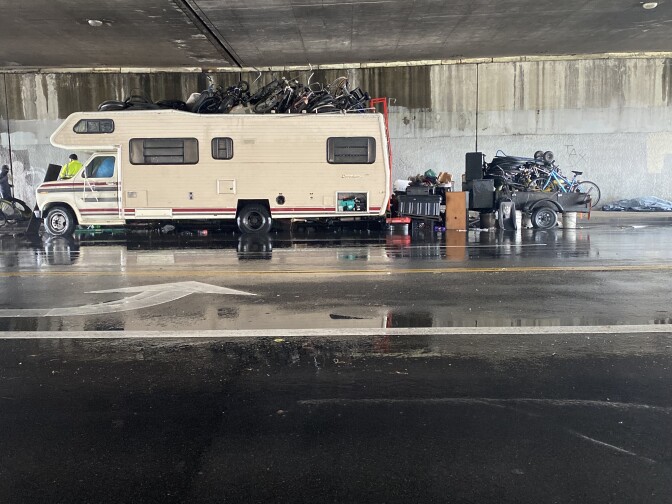The latest homeless count from the Los Angeles Homeless Services Authority (LAHSA) found that 25% of unhoused people in L.A. County self-reported experiencing a severe mental illness (SMI). That’s up from 24% from last year's count.
The latest count, which was conducted over a three-day period in January, found that there are more than 75,000 unhoused people in L.A. County.
The data on mental illness was collected during a demographic survey in which participants are asked whether they have or have been diagnosed with a severe mental illness.
The latest reporting on the unhoused community is a reminder of the thousands of people living on the streets in L.A. who deal with debilitating mental illness.
Deborah Smith's son, Nick, was unhoused and unsheltered between November 2022 and February of this year. He’d been diagnosed since his early 20s with bipolar disorder and later schizophrenia.
Smith said she remembers fighting for months to get her son into shelter and care during the worst of the storms that pummeled L.A.
“The entire thing was a nightmare,” Smith said. “I couldn’t sleep at night when I would hear the rain. I knew that due to his mental illness, that he was not making good choices for himself.”
Smith said Nick was not drinking water due to his psychosis and was subsisting on a diet of Slim Jims and Red Bull. She said Nick was finally assessed by a field psychiatrist with L.A. County’s Homeless Outreach & Mobile Engagement (HOME) program and only then did he start receiving some of the services he needed.
For her part, Smith doesn’t believe Nick would have self-reported that he lives with a severe mental illness, due to stigma around SMI and a common symptom of mental illness called anosognosia, or lack of insight.
Brittney Weissman is executive director of Hollywood 4WRD, where she does outreach for a new pilot project that aims to help people living with a serious mental illness get care within their own community in Hollywood.
“That number seems low,” Weissman told LAist, referring to the 25% SMI figure represented in LAHSA’s latest report. “I think a lot more people in the street live with serious mental illness.”
Weissman, who also previously served as CEO of NAMI Greater Los Angeles County, said clarity gets lost when people are asked to self-report living with SMI.
Randall Kuhn, professor at the Fielding School of Public Health at UCLA and a lead demographer on the LAHSA count said one of the goals in the coming months is to use some of the demographic survey data to compare the level of mental illness with duration of homelessness.
One thing is clear from multiple studies, Kuhn said: “The longer you’re homeless, the worse your physical, mental and substance use status is.”









